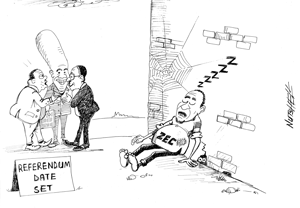
There appears to be no fierce contest in the referendum set for March 16 as compared to the one held in February 2000 since all political parties in the Government of National Unity have decided to champion a Yes vote. As such, the process is likely to be a mere fulfilment of democratic processes before Zimbabwe goes for a harmonised election earmarked for this year again.
Report by Gumisai Nyoni
The wonderful thing to come out of democracy is that the majority will always triumph while its wickedness is that even rational and progressive contributions might be sidelined because of their minority appeal. This truth will affect groups and movements that are campaigning for a No vote. The scenario in Zimbabwe today mirrors the outcome of the Lancaster House Conference, in which the Ian Smith regime and the liberation war movements had to negotiate to reach a settlement, paving way for the 1980 elections.
The MDC formations and Zanu PF reached a compromise maybe because they all discovered a way to protect their interests, not necessarily meaning they are representing the will of the majority. And there are high chances that the new constitution, resulting from this compromise, will again be amended, if not more than 19 times like the current one, in the event that a single political party sweeps to the helm of leadership, to suit its peculiar demands other than those of the GNU.
Worsening the situation is the lack of interest by ordinary people with little intellect to grasp the draft constitution. It is the opinion leaders in their communities who will influence how the masses will vote. This will automatically lead to voting trends whereby people align themselves to what their political representatives want. They rarely vote for what they know, but what they would have been told to believe as right.
A No vote is just a pipedream, rendering the referendum a platform through which political parties can shut out civic groups expressing dissenting sentiments.
As opposed to the 2000 referendum in which voting trends were largely determined by economic decline resulting from the dishing out of money to the war veterans and the involvement of Zimbabwe in the DRC war, the euphoria associated the MDC formation and the disgruntlement of the workers who were hard hit by effects of the Economic Structural Adjustment Programme, voters are now eager to retain the current status quo marked by economic revival — a situation that ensued after dollarisation in 2009.
It appears the greatest monsters Zimbabweans are battling include escalating unemployment and the ravaging poverty, giving less attention to irrational political squabbling.
- Chamisa under fire over US$120K donation
- Mavhunga puts DeMbare into Chibuku quarterfinals
- Pension funds bet on Cabora Bassa oilfields
- Councils defy govt fire tender directive
Keep Reading
The nation has endured a lot of suffered to an extent that the majority have lost real interest in participating in issues that do not yield immediate benefits.
It has even become less fashionable among many people to attend rallies and party gatherings, a development that is likely to manifest itself in voter apathy during the coming referendum.
The greatest disadvantage to be recognised in the future is that governance flaws of the GNU will be entrenched, while politicians will continue to thrive on the docility of the general public to railroad their political ambitions in the name of democracy.
It leaves a lot of unanswered questions as to why Zanu PF suddenly changed like a chameleon to fully support the Copac’s draft constitution when they had upped their tempo to denounce it a few months ago. Something behind the scenes must have transpired to convince the hardliners in the party to welcome the draft which they used to describe as anti-people, devoid and detached from people’s views.
On the other hand, the MDC factions must have mastered the art of trickery or being tricked to an extent that they can now safely wine and dine with Zanu PF without a hustle.
The real battle lies not in March, whose peace and transparency will probably replicate the harmonised polls of 2008. The only difference being that the peaceful outcome will be a product of unison than tension among political parties. It will be marked by low tempo and stage-managed celebrations, since no serious objections are likely to prevail.
Only elections will define the fate the nation has been waiting for after a decade of tussling. The March’s political game is nothing more than a necessary development to suffice democratic demands. The real battle lies ahead. The public must however, exercise their democratic right and choose that which drives Zimbabwe out of the socio-political and economic trenches.











